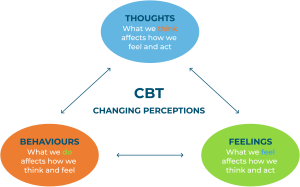What is Cognitive Behavioral Therapy?
Cognitive behavioural therapy is a type of psychotherapy that works by teaching people new ways to think and behave. It can be used to treat a variety of mental health conditions, such as anxiety and depression. It is one of the most widely researched therapies, and there are many studies showing that it is effective.
CBT is based on the notion that our emotions and behaviour are influenced by how we perceive events and situations rather than the actual circumstances themselves. This is known as the cognitive model of mental illness and was developed by Beck in 1964. CBT is also based on the idea that our thoughts influence our feelings, and that negative or unhelpful thoughts can lead to unpleasant emotions and behaviours.

The aim of CBT is to help you transform your negative perceptions and distortions into more helpful ways of thinking. This can involve challenging your automatic thoughts (thoughts that happen without you being aware of them) and looking at their rationality. It can also involve identifying and changing unhelpful beliefs that lead to unpleasant emotions and behaviours.
Cognitive Behavioral Therapy
CBT can be delivered by counsellors, psychologists and therapists in one-on-one sessions or in groups with other people who have similar problems. It can also be delivered online. Often ‘homework’ is given between sessions which involves tracking your progress and completing a variety of activities to help you change unhelpful thoughts and behaviours.
During CBT you and your therapist will work together to break down your problem into different parts such as your thoughts, physical feelings and actions. You will then analyse these areas to identify unhelpful patterns and find ways to change them. You will practise these changes in your everyday life and discuss how you got on during your next session. The goal is to achieve real, lasting changes in your mood and behaviour.
It is important to note that although research shows that CBT is an effective treatment, it does not make your symptoms go away completely. It is usually combined with other forms of therapy or medication to achieve the best results. Those who are taking part in CBT are typically able to improve their mood more quickly than those who do not receive treatment.
The benefits of CBT are that it can be short-term, teaches you skills that you can use for the rest of your life and is easy to learn. It can be uncomfortable at times because it can temporarily stir up or worsen your emotional symptoms, but this is a normal part of the process.
It is important that your therapist is honest with you and has empathy, sensitivity and support. It is also important that you approach therapy as a partnership, and that you participate actively. The more you put into your therapy, the more it will benefit you. There are a number of self-help books that can assist you with developing your own CBT program, such as Manage Your mood: Behavioral Activation Techniques for Depression by Veale and Wilson, published by Robinson: London and The ‘Overcoming’ series of books by Beck A T (1976). There is also a free app called Moodgym available to help you track your progress and develop your skills between sessions.